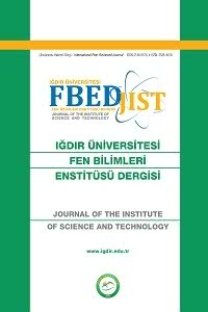Technical and economic comparison of conventional, modify conventional and electrochemical coagulation processes
Geleneksel, düzenlenmiş geleneksel ve elektrokimyasal koagülasyon yöntemlerinin ekonomik ve teknik açıdan karşılaştırılması
___
- Alaa G. M. Osman, W. K. 2010. Water Quality and Heavy Metal Monitoring in Water, Sediments, and Tissues of the African Catfsh Clarias gariepinus from the River Nile, Egypt. Journal of Environmental Protection, 1, 389-400.
- APHA, 1998. Standard Method for the Examination of Water and Wastewater, 20 th edn, America Water Works Association and Water Pollution Control Federation, Washington DC.
- Chen, G 2004. Electrochemical technologies in wastewater treatment Separation. Purifcation Technologies 38(1), 11-41.
- Dake, N.B. 1983. Essentials of Engineering Hydraulics. Hong Kong: Macmillan Press.
- Ellis, K.M., 1988. Surface Water Pollution and its Control, 2nd Edn., Macmillan, London.
- Metcalf and Eddy Inc., 1991. Wastewater Engineering Treatment Disposal and Reuse, 3 rd Edn., McGraw Hill Book Company, New York, USA.
- Noyes, R. 1994. Unit Operations in Environmental Engineering, 1st edn, Noyes Publication, New Jersey.
- Oke I. A., Olorunniwo E. O., E. A. Taiwo, G. M. Oyatogun, Atanda P. O. and A. A. Obiniyi 2012 Edited: Kostas Demadis. An Overview of Electrochemical: Technique for Decolouring Aqueous Solutions with Optimization and Economics in Water Treatment Processes, First edition, Nova Science Publishers, Inc. New York.
- Oke, I. A 2007. Development and Performance- Testing of an Electrochemical Process for Selected Industrial Wastewaters. Unpublished PhD. Thesis, (Civil Engineering Department), Obafemi Awolowo University, Ile-Ife.
- Oke, I. A.; 2011. A Water Purifcation Technique In 21 st Century: A Trial On Rural Water Sources. A paper presented at 5 th WARIMA Conference, Sierra Leone 29 th November 2 nd.
- Oladepo, K.T.; I.A. Oke and M.O. Ogedengbe 2011. Evaluation of An Electrochemical Method of Coagulation for Surface Water Treatment. Ife Journal of Technology, Special Issue. 20 (2), 81-88.
- Pablo C. F. Mart´ınez, C. J., Cristina S. and Manuel A. R.2009. Technical and economic comparison of conventional and electrochemical coagulation processes. J Chem Technol Biotechnol. 84: 702710.
- Steel, E.W., and McGhee, J.T. 1979. Water Supply and Sewerage, 1st ed. Tokyo: McGraw Hill Book Company.
- Tebbutt, T.H.Y., 1991. Principles of Water Quality Control, 3 rd edn, Pergamon Press, Oxford.
- Umran, T.U; Koparal, A.S and Ulker, B.O. 2009 Electrocoagulation of Vegetable oil Refnery Wastewater Using Aluminium electrodes. Environmental Management 90, 428-433.
- Viessman, W., and Hammer, M. 1993. Water Supply and Pollution Control. New York: Harper Collins College Publishers.
- ISSN: 2146-0574
- Yayın Aralığı: 4
- Başlangıç: 2011
- Yayıncı: -
Su Ürünleri Havuzlarında Atık Yönetimi
Trend and frequency analyses of rainfall in North west geopolitical zone of Nigeria
Isaiah Adesola OKE, Abubakar ISMAİL
Zehra Tuğba ABACI, Zehra Tuğba ABACI
Gökçe Didar DEĞERMENCİ, Yalçın Kemal BAYHAN, Nejdet DEĞERMENCİ
Parazit Çiçekli Bitkilerin Gelişimi ve Hayat Tipleri
Burak SÜRMEN, Hamdi Güray KUTBAY, Hakan YILMAZ
Ahmet Metin KUMLAY, Neşet ARSLAN, Canan KAYA
Nijerya’nın Kuzeybatı Jeopolitik Bölgesine Düşen Yağış Miktarlarının Eğilim ve Frekans Analizi
